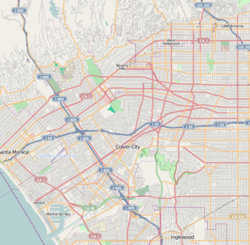Reynier Village, Los Angeles
Reynier Village, Los Angeles | |
|---|---|
 "Welcome to Reynier Village" sign located at the intersection of Cadillac & Shenandoah. | |
| Coordinates: 34°02′24″N 118°23′05″W / 34.0400406°N 118.3847449°W | |
| Country | |
| State | |
| County | |
| Time zone | Pacific |
| Zip Code | 90034 |
| Area code | 310 |
Reynier Village is a neighborhood on the Westside of Los Angeles, California. The Reynier Village neighborhood was known as Reynier Park in the 1920s and 1930s although the actual city park was not established until the late 1970s. For many years, real estate agents had called the area "Beverlywood adjacent" or "south Robertson" (the name of the neighborhood council, which encompasses several neighborhoods including Reynier Village).[1]
Geography
[edit]Reynier Village is a triangular-shaped neighborhood bordered on the north by Cadillac Avenue; on the west by Robertson Boulevard; and on the southeast by Kramerwood Place, the 10 Freeway, and Garth Avenue.[2][1] The Reynier Park operated by the City of Los Angeles Parks and Recreation Department is bounded by Reynier Avenue, Olin, Shenandoah Street, and Hargis.[3] Councilman Zev Yaroslavsky advocated for the creation of the park in 1978.[3]
Reynier Village is south of La Cienega Heights and southwest of Faircrest Heights.
The Los Angeles Times' Mapping L.A. project places Reynier Village is in the larger neighborhood of Mid-City.[4] However, according to the Reynier Village neighborhood association, the village is in Zone 5 of the South Robertson neighborhood.[1][5]
History
[edit]
According to locals, the subdivision was named after a family whose home stood on what it now the city-maintained Reynier Park at 2803 Reynier Avenue.[1][6]
The residential subdivision was developed about 1921 by a real estate company.[1] The Reynier Park Improvement Association was affiliated with five other neighborhood groups in 1927.[7] In 1929 the association was vocally opposed to an increase in Pacific Electric streetcar fares, especially on the neighboring Venice Short Line.[8] In 1930 the group requested public fire alarm boxes for "for that section from National boulevard to Pico boulevard and extending from Venice boulevard to the hills west of Robertson bouleyard in the district of Raynier Park".[9] In 1931 the group was advocating for the channelization of Ballona Creek.[10] In 1934 the newly constructed Benedict Canyon creek storm drain alleviated previously common street flooding "kept the area in Palms and Reynier Park near the Alexander Hamilton high school comparatively dry" and thus Culver City buses were rerouted to Robertson instead of Washington during the rains.[11]
Rocha House
[edit]A well-preserved 1 1/2 -story adobe in the heart of this small West Los Angeles neighborhood speaks to its early days as part of the Rancho Rincon de los Bueyes (which means "corner of the oxen"). Built in 1865 by Antonio Jose Rocha II, the privately occupied residence at 2400 Shenandoah St. in 1963 became Los Angeles' 13th historic-cultural monument.[1]
Rocha House, the 13th Los Angeles Historic-Cultural Monument, is located in the village.[12]
Services
[edit]Shenandoah Street School is located in Reynier Village.[12] The neighborhood is served by the Robertson branch of the Los Angeles Public Library.
In popular culture
[edit]Reynier Park makes an appearance in Paul Beatty's 2003 Los Angeles novel The White-Boy Shuffle.[13]
Notes and references
[edit]- ^ a b c d e f Groves, Martha (February 26, 2006). "Spanish style still defines central pocket". Los Angeles Times. Retrieved September 15, 2020.
- ^ "Reynier Village Neighborhood Association Map". Retrieved 3 July 2018.
- ^ a b "Way Cleared for West L.A. Park Site". The Los Angeles Times. 1978-07-23. p. 583. Retrieved 2023-11-04.
- ^ [1] Location of Reynier Village on Mapping L.A., Los Angeles Times
- ^ Reynier Village Neighborhood Association
- ^ "REYNIER PARK". City of Los Angeles Department of Recreation and Parks. Retrieved 2020-09-16.
- ^ "Form United Western L.A. Association". Evening Vanguard. 1927-09-29. p. 1. Retrieved 2023-11-04.
- ^ "Street Car Fares Asked by Chamber". Evening Vanguard. 1929-04-18. p. 10. Retrieved 2023-11-04.
- ^ "Fire Protection Asked". Los Angeles Evening Express. 1930-04-17. p. 15. Retrieved 2023-11-04.
- ^ "Move to obtain federal aid for flood control". Evening Vanguard. 1931-11-14. p. 1. Retrieved 2023-11-04.
- ^ "Storm drains". Evening Vanguard. 1934-01-04. p. 1. Retrieved 2023-11-04.
- ^ a b Kitazawa, Yosuke (September 10, 2012). "Reynier Village". KCET. Retrieved September 15, 2020.
- ^ Beatty, Paul (2014-12-23). The White Boy Shuffle. Picador. p. 39. ISBN 978-1-4668-8782-4.

